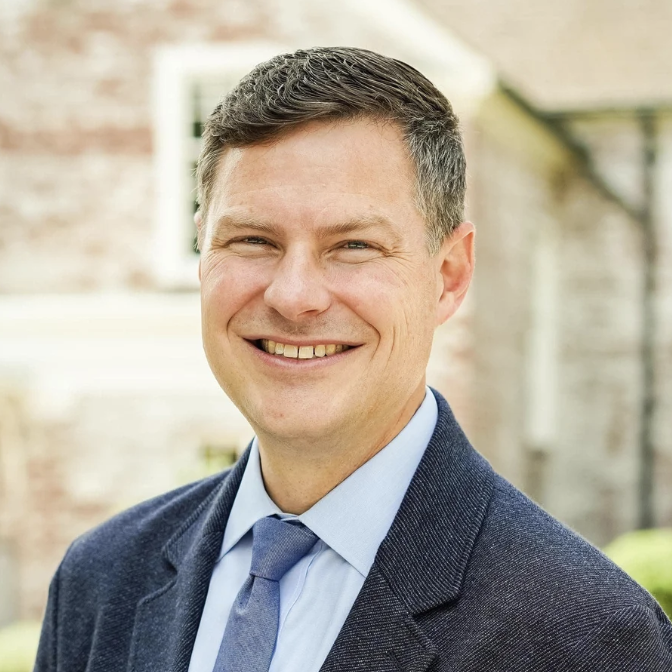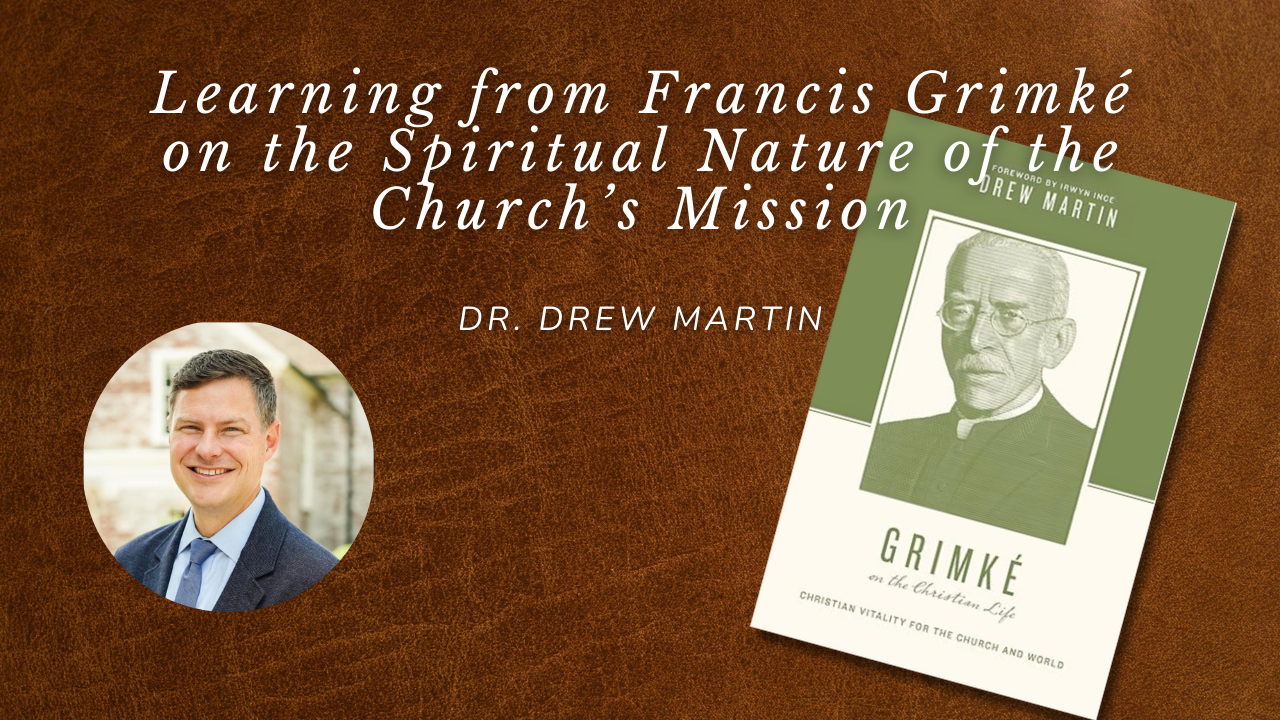Francis Grimké pastored for fifty years through racism and division, holding fast to the gospel while speaking to the injustices of his time. Drew Martin, in his new book, reflects on Grimké’s vision of the church’s spiritual mission and how it can steady us in today’s polarized world. In the short interview below, Martin unpacks Grimké’s vision of the church’s mission and why it still matters today.
What inspired you to write this particular book and how did Francis Grimké’s vision of the Christian life resonate with the themes you think matter most in today’s church?
I first became aware of Francis Grimké in graduate school at Vanderbilt. I was helping to teach courses in American religious history, and we were using lots of texts by Methodists and Baptists. Seeking to supplement those texts, I discovered the rich history of Black Presbyterians who championed orthodox Protestant theology and were very significant in shaping the course of American history.
My interest deepened after I moved to Charlotte to help plant a church. Our launch team and leadership reflected the historically Black neighborhoods around our church, and we gained much insight by reading Grimké’s writings.
In recent years, it seems to me that Christians have really struggled to understand the relationship between nature and grace. This struggle has hampered our ability to address a wide range of spiritual and social questions, a problem that affects both sides of the political spectrum. Grimké’s wisdom gleaned from fifty years of ministry in difficult circumstances inspires me. When the opportunity arose with Crossway to write a book about him, I jumped at the chance.
How would you define the term “spiritual mission of the church”? Did Grimke interact directly with that term?
Grimké frequently appealed to the distinction between the “spiritual” and the “temporal.” He regularly used the word “spiritual” to describe the mission of the church and the features of the church that made it different from other institutions.
He relentlessly criticized Christians of his day who made the same error made by the people of God in Jesus’ day, “looking for a Messiah who was to set up a temporal kingdom.” On the contrary, he declared that the kingdom of God is “spiritual” and “set up in the hearts” (Works, III.189). He lamented the tendency to “pass over lightly things which have to do with our spiritual welfare” and “the tendency to become absorbed in the mere temporalities of life.” For Grimké, the duty of Christian ministers is to confront this tendency, seeking to “keep people in touch with spiritual things” such as “the thought of God,” Christian character, and “endless life beyond the grave” (Works, III.185).
He also taught that the “power” of the church in the community is a “spiritual power,” different from power arising from “material conditions” like money or status (Works, III.466-67).
In short, Grimké viewed the church’s spiritual mission as proclaiming Christ, winning converts, and discipling them in Christian character and life, which were the three tasks he outlined in his sermon “The Nature and Mission of the Christian Church.” He makes similar points in “Christ’s Program for the Saving of the World.” Both sermons are in the Howard University archives and discussed in my book.
It’s important to note that Grimké’s understanding differed from some old school notions of the “spirituality of the church,” particularly those used to silence the church on slavery. Grimké’s doctrine did not prevent him from preaching moral issues. It did, however, lead him to distinguish between morality and politics, which I’ll say more about below.
What did Grimké mean by the “gathered” and “scattered” church and what bearing does it have on our ideas about the “spiritual mission of the church”?
Grimké advocated the classical Protestant distinction between the “general calling” of all Christians and the “special callings” of individual believers. The mission of the institutional church is ordered to this shared general calling through preaching, worship, evangelism, and sanctification. As he said in “The Nature and Mission of the Christian Church,” “The church is not a social organization” oriented to the achievement of temporal ends through alternative means.
At the same time, he viewed the church as a “missionary society” that scatters as its members live in the world. Christians bear witness to Christ as they live in accordance with the diversity of gifts they have received. The lawful professions and daily endeavors of Christians are a blessing to the world around them. This is why my book includes chapters not just on the church but also on the individual, the family, and society. Grimké was deeply committed to his pastoral calling, but also served on the school board, was a longtime trustee at Howard University, and played a crucial role in the early NAACP, just to name a few examples.
Grimké had a long ministry in troubled cultural times. How did he integrate—or distinguish—his pastoral responsibility and his civil engagement?
Grimké saw general and special callings as distinct yet complementary.
He avoided the mistake of collapsing them—an error that causes mission drift in the church. But he also avoided the opposite error of failing to encourage Christians in their special callings, which often leads to pietism and quietism. He tried to model this in his own life.
One practical example, which I recount in the book, is how he chose not to take a formal role in the NAACP, though he personally supported its goals and was recruited to do so. He believed such a formal role would conflict with his pastoral duties. Instead, he encouraged his brother Archibald, an attorney, to take up that role. In the meantime, his informal support was crucial to the organization’s success. He praised the NAACP when it stood for justice, such as when it opposed lynching, and he also critiqued its leadership on at least two occasions for actions he took to be unjust. In all this, he tried to live as a faithful pastor, shepherding his whole flock who shared “one Lord, one faith, and one baptism” (Ephesians 4:5), and at the same time to live as a faithful Christian with giftings that extended beyond the scope of his pastoral work.
The central point is that his pastoral role was not in conflict with his support of the NAACP, but his pastoral role did circumscribe the nature of his involvement in certain ways that might not apply to a Christian who is not a pastor. It takes great wisdom to wear multiple hats. Grimké likely would not have claimed he did so perfectly, but we can learn from how he faithfully attempted to do this over decades of ministry.
In your book, you have two chapters on Grimke’s thoughts on the family. Typically today, conservatives talk more about ‘family values’ and progressives more about ‘racial justice.’ Yet Grimke talked about them both. What do you make of this? And how might this inform the way pastors today link these two issues together?
Two key points come to mind. First, Grimké preached the whole counsel of God. He was willing to offend both the left and the right by clearly preaching biblical moral teaching.
Second, he was shrewd enough not to be co-opted by any political party. Many Christians today—pastors included—are naïve in this area. Grimké may have had his blind spots, but he was not politically naïve. His sermons did not shy away from moral issues, but he often moved between personal and social righteousness in his preaching. An example I discuss in the book is a sermon on the seventh commandment, which he began by discussing societal justice before turning to personal purity. As I already mentioned, he also was an equal opportunity offender. Pastors today would do well to learn from this approach.
Grimké advocated for both preaching the gospel and fighting racial prejudice, distinguishing but not separating them. How did this “both-and” approach contribute to the spiritual vitality of his Christian life and the church’s work during a time of significant injustice?
Two distinctions stand out.
First, Grimké upheld the distinction between law and gospel. He taught that the law convicts of sin and points to our need for Christ while also instructing believers in righteous living. He held on to the multiple “uses” of the law which lead to and flow from the gospel.
Second, he distinguished between morality and politics. Unlike more totalizing conceptions of politics, Grimké believed that the boundaries may be porous, but nevertheless the lines between morality and politics can be distinguished. Saying “murder is wrong” is a moral claim. Saying “We should take step x to prevent murder” is a political claim. The latter is morally laden but moves beyond morality into the realm of prudential judgment. Such judgments typically are context dependent.
In my book, I explore how Grimké preached moral claims while avoiding endorsements of parties or platforms. Christians can agree on moral principles while differing on political applications. Pastors – even those rare few with training in political theory or experience in political work – should respect these legitimate differences.
What part of Grimké’s life or theology surprised you the most while writing this book?
Francis and his wife, Charlotte, hosted an “Art Club” in their home on Friday evenings for over thirty years during the winter months. Together with family and friends they explored painting, literature, architecture, and sculpture. It’s amazing to me that they took time for this amidst the burdens of pastoring and social advocacy.
As I note in the book (p. 32), while he clearly distinguished between what he took to be spiritual concerns and matters he variously referred to as “natural,” “material,” or “secular,” Francis Grimké in no way rejected engagement with the world. In fact, he enjoyed and advocated for temporal morality and temporal beauty. Spiritual concerns were of ultimate importance, but this did not mean that material concerns were insignificant.
What can pastors in the PCA today learn from Grimké about preaching in hard times or during public crises?
One word: “hope.”
Grimké was born enslaved and ministered through Reconstruction’s collapse, Jim Crow, and racism in the church. He was not naïve. But he believed in the resurrection of Jesus Christ, and that gave him hope.
Christ has died. Christ is risen. Christ will come again.
Thus, he wrote that there is “no reason to become discouraged, though at times things may look pretty dark…” Instead, “we are hopeful, and will ever be” because “Jesus Christ has set his kingdom up in the world,” and the gates of hell will not prevail against it (Works, III.330-31).
I tend to think that will preach.
Drew Martin is associate professor of systematic theology at Covenant Theological Seminary, has served several churches as a pastor and as a church planter, writes on the history of Christian theology, and is the author of Grimke on the Christian Life: Christian Vitality for the Church and the World (Crossway).

